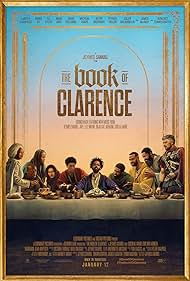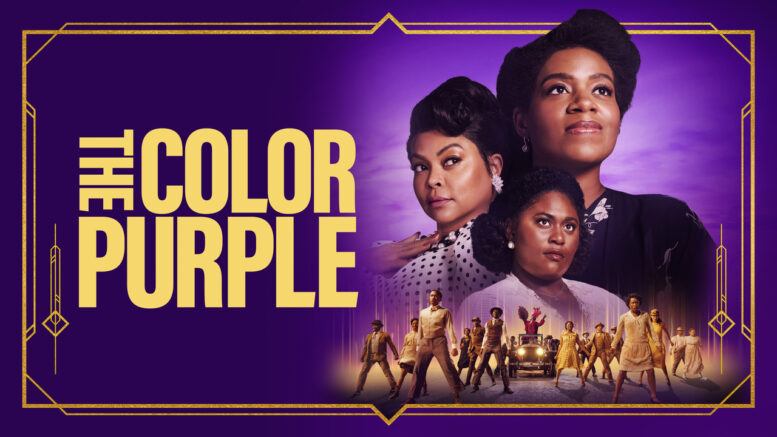Now that the Screen Writer’s Guild strike is over, Hollywood is producing for us, one after the other movie premieres. Let me be more specific, we’ve had the opportunity to witness three, black star-studded cast, movies three weeks in a row. Since I am an active movie goer, I am ecstatic. I’m sharing my excitement with you because I’m always looking for the moral of the story and if there’s any spiritual edification in the message. In case you haven’t notice, there is always a message underlying the entertainment surface of the movie.
On Christmas Day, I purchased tickets for my family to watch the rebirthing of The Color Purple together. Previously I shared how Alice walker’s book became a movie, then a Broadway musical, and now a movie/musical. My first watching I left the theatre fractured. I couldn’t connect with what I saw, what I recalled from the first movie. So, the next week, I was at the movies again. This time, I’m focused, and looking for the deeper meaning. I saw what I needed to see, heard what I needed to hear, and experienced what I needed.
This version of The Color Purple was very captivating, stimulating, and had great curb appeal. The universal message becomes more understood and hopefully allows the millennials to connect. Nevertheless, this is still a story of abuse, rejection, ignorance, and mental anguish. Yet, Cellie is the catalyst that allows us to see, and experience a sense of forgiveness and redemption. Although, the audience is probably wishing Mister was dead, we witness a full circle for them. In spite of what Cellie, Sophia, Shug, Squeak, Nettie, Harpo, and Mister suffered, it brings us to a place of reconciliation.
As I said, I’m always looking for the deeper matter at hand. I want all of us to recognize what is being communicated, rather than just being entertained. Cellie is awakened to a new level of possibilities and is redeemed to life once she finds out that her sister and her children are still alive! Thank you, Jesus!

The following week I traveled to see, “American Fiction.” Once I saw the cast on The Tamron Hall Show, it had to be seen. Here’s another mostly black cast, telling another black story, and there it was again, the message of forgiveness and redemption. Jeffrey Wright plays a writer whose stories are not selling; therefore, he a struggling professor. His dad is deceased; however, his life left a lot of unsettled issues for the family. Mom (played by Leslie Uggams) has Alzheimer, sister (Ellen Tracee Ross) is stuck caring for mom, while overcoming a divorce (that no one knows about), brother (Sterling K. Brown) is estranged from the family, married but battling with being gay! Apparently, everyone is hiding their story, their wounds, and struggles. Jeffrey’s character returns home to assist with cleaning out the beach-home, after dad’s passing. Each one is forced to confess their truth, and recognize the impact of the family dynamic and repent. Jeffery’s love interest (Erika Alexander) and another writer (Issa Rae), help bring him to the light of telling his truth, asking for forgiveness, and redeeming his relationships, and his life. It is uncanny, how we co-existence in family relationship (and other relationships) in unhealthy states, while pretending to be okay! Once Jeffrey is awakened to his own problems and the impact on others, he is able to unlock those doors and reconcile the relationships. This is why Jesus told us, “Forgive, and you will be forgiven (Luke 6:37).”

Finally, I had the courage to see, “The Book of Clarence.” This was a very interesting approach to the traditional biblical stories as we know them. It took a moment for me to be still and allowed the story to playout versus retaliating because I thought it was wrong! Hello, somebody! Well, it is primarily a cross-relational between “Doubting Thomas,” and his twin brother Clarence. Clarence is an outright non-believer, and Thomas is a committed disciple. However, Clarence is the one who remains at home to care for their mother. He has no real means of supporting them, so he resorts to being a street-hustler. Thomas is condescending towards Clarence because of his lifestyle!!! In the art of keeping this simple, the stories carry a juxtaposition of good and evil. Although Clarence professes to not believe, there are a series of events that he proves to have more of a moral fabric than his brother Thomas, and many of the followers. We see miracles, signs, and wonders that causes Clarence to have a change of heart and for the others (good and evil characters) to examine themselves. Because Clarence pretends to be the “new” Messiah, he is now bout to be crucified. Through these ups and down, there is a spirit of forgiveness and redemption that brings the family back together!
I need you to know that this movie was little unorthodox to me; however, I realized the moral of its story. That’s how it is with God’s love, once you experince.His way of life migh seem unnatgural or unorthodoxed, but if we would believe and trust Him, we will reap the benefits of His love. God wants us to forgive. Forgiveness is an intentional decision to let go of resentment and anger. The Bible teaches that unselfish love is the basis for true forgiveness, since “it keeps no record of wrongs” (1 Corinthians 13:5).
The greatest message I heard throughout the three movies is we have to learn to let go, and grow. Imagine if Cellie became bitter and angry. Yes, it could be justified by it is not beneficial. Jeffry’s character had to stop being bitter and anger, in order to let others in. Clarence learned that the Messiah was real, and wa offering a better way of life for him, and his family. Forgiving is outside of the norm, but it is essential inside the body of Christ. Christ died that we might have life, and have it more abundantly. You are not experiencing the abundant life if you are still harboring anger, malice, hatred, envy and strife. Christ has redeemed us, so we ought to be willing to redeem others. II Corinthians 5:18 says, “Now all things are of God, who has reconciled us to Himself through jesus Christ, and has given us the ministry of reconciliation.
So, instead of us sitting in our high chairs looking down on others, we have to first consider our own ways, repent, and then reconcile. When we forgive and reconcile our relationships, it extends the power of redemption in Christ. Without forgiveness and redemption we are doomed to the pit of hell. If it was important to the divine Trinity, it should be important to us. God is watching us, and the world is watching too. How we treat one another is the real manifestation of the righteousness and the power of God us.
Stay tuned! I’ll be back with the media and the message!

Be the first to comment on "The Media and the Message"